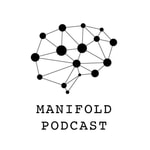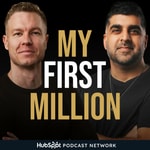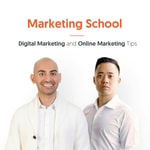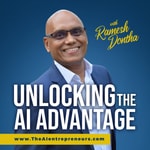Manifold – Details, episodes & analysis
Podcast details
Technical and general information from the podcast's RSS feed.

Manifold
Steve Hsu
Frequency: 1 episode/17d. Total Eps: 142

Recent rankings
Latest chart positions across Apple Podcasts and Spotify rankings.
Apple Podcasts
🇨🇦 Canada - naturalSciences
01/08/2025#37🇬🇧 Great Britain - naturalSciences
01/08/2025#2🇬🇧 Great Britain - science
01/08/2025#58🇩🇪 Germany - naturalSciences
01/08/2025#81🇺🇸 USA - naturalSciences
01/08/2025#35🇫🇷 France - naturalSciences
01/08/2025#71🇨🇦 Canada - naturalSciences
31/07/2025#30🇬🇧 Great Britain - naturalSciences
31/07/2025#3🇬🇧 Great Britain - science
31/07/2025#55🇺🇸 USA - naturalSciences
31/07/2025#40
Spotify
No recent rankings available
Shared links between episodes and podcasts
Links found in episode descriptions and other podcasts that share them.
See all- https://openai.com/
251 shares
- https://marginalrevolution.com/
64 shares
- https://twitter.com/hsu_steve
38 shares
- https://twitter.com/Aella_Girl
8 shares
RSS feed quality and score
Technical evaluation of the podcast's RSS feed quality and structure.
See allScore global : 63%
Publication history
Monthly episode publishing history over the past years.
Letter from Reykjavik: Genomics, Chess, Hyperscaling genAI, and Quantum Black Holes — #67
Season 2
jeudi 29 août 2024 • Duration 35:30
This is a short episode recorded at the end of a trip to Caltech (LA), Frankfurt, and Reykjavik.
Black hole information and replica wormholes at Caltech (talk slides):
https://stevehsu.substack.com/p/black-hole-information-and-replica
00:00 Intro: summer in Iceland
02:04 deCODE genetics
05:52 Chess: Bobby Fischer in Reykjavik
11:56 Hyperscaling genAI
23:11 Synthetic data and Hyperscaling
24:26 Is the Transformer architecture enough for AGI?
29:45 Quantum black holes
Music used with permission from Blade Runner Blues Livestream improvisation by State Azure.
--
Steve Hsu is Professor of Theoretical Physics and of Computational Mathematics, Science, and Engineering at Michigan State University. Previously, he was Senior Vice President for Research and Innovation at MSU and Director of the Institute of Theoretical Science at the University of Oregon. Hsu is a startup founder (SuperFocus.ai, SafeWeb, Genomic Prediction, Othram) and advisor to venture capital and other investment firms. He was educated at Caltech and Berkeley, was a Harvard Junior Fellow, and has held faculty positions at Yale, the University of Oregon, and MSU. Please send any questions or suggestions to manifold1podcast@gmail.com or Steve on X @hsu_steve.
Robin Hanson: Prediction Markets, the Future of Civilization, and Polymathy — #66
Season 2
jeudi 15 août 2024 • Duration 01:20:47
Robin Hanson is a professor of economics at George Mason University. He has worked in a variety of fields, including Physics, AI, Economics, and Futurism.
Follow him at https://x.com/robinhanson
"When the typical economist tells me about his latest research, my standard reaction is 'Eh, maybe.' Then I forget about it. When Robin Hanson tells me about his latest research, my standard reaction is 'No way! Impossible!' Then I think about it for years." -- Prof. Bryan Caplan, GMU
0:00 Introduction
00:34 Welcome and Manifest conference introduction
03:12 Robin Hanson: Education and Early Influences
08:38 Transition from Physics+AI to Social Science and Economics
22:02 Prediction Markets: Potential and Challenges
28:37 Cultural Drift and Challenges to Modern Society
40:49 Fertility and Demography
48:37 Life as a Polymath
59:27 Future of Artificial Intelligence and the Simulation Question
01:09:29 Audience Q&A
Music used with permission from Blade Runner Blues Livestream improvisation by State Azure.
--
Steve Hsu is Professor of Theoretical Physics and of Computational Mathematics, Science, and Engineering at Michigan State University. Previously, he was Senior Vice President for Research and Innovation at MSU and Director of the Institute of Theoretical Science at the University of Oregon. Hsu is a startup founder (SuperFocus.ai, SafeWeb, Genomic Prediction, Othram) and advisor to venture capital and other investment firms. He was educated at Caltech and Berkeley, was a Harvard Junior Fellow, and has held faculty positions at Yale, the University of Oregon, and MSU. Please send any questions or suggestions to manifold1podcast@gmail.com or Steve on X @hsu_steve.
Casey Handmer: Terraform Industries and a carbon-neutral future — #57
Season 2
jeudi 4 avril 2024 • Duration 01:02:02
Casey Handmer (PhD, Caltech, general relativity) is the founder of Terraform Industries. He is one of the most capable and ambitious geo-engineers on planet Earth!
Terraform Industries is scaling technology to produce cheap natural gas with sunlight and air. Using solar energy, they extract carbon from the air and synthesize natural gas, all at the same site.
March 2024: "Terraform completes the end to end demo, successfully producing fossil carbon free pipeline grade natural gas from sunlight and air. We also achieved green hydrogen at <$2.50/kg-H2 and DAC CO2 at <$250/T-CO2, two incredible milestones."
Links:
- Casey Handmer’s website: https://www.caseyhandmer.com/
- Terraform Industries: https://terraformindustries.com/
- Nerds on Patrol [Episode 3] - Terraform Industries: https://www.youtube.com/watch?v=H9k3dHFJPEU
Steve and Casey discuss:
0:00 Introduction
00:31 Casey's early life and background, from Australia to Caltech
07:55 The academic path and transition to tech entrepreneurship
10:40 Terraform Industries
15:21 Solar costs, efficiency, and global Impact
24:25 A world powered by Terraform methane
31:27 The entrepreneurial journey: challenges and insights
35:01 Investor dynamics and strategic decisions for Terraform
41:28 The hard Reality of manufacturing and innovation
44:11 Navigating intellectual property and strategic partnerships
45:49 The moral and technical challenges of carbon neutrality
55:48 Looking ahead: Terraform's next milestones and the solar revolution
Music used with permission from Blade Runner Blues Livestream improvisation by State Azure.
--
Steve Hsu is Professor of Theoretical Physics and of Computational Mathematics, Science, and Engineering at Michigan State University. Previously, he was Senior Vice President for Research and Innovation at MSU and Director of the Institute of Theoretical Science at the University of Oregon. Hsu is a startup founder (SuperFocus.ai, SafeWeb, Genomic Prediction, Othram) and advisor to venture capital and other investment firms. He was educated at Caltech and Berkeley, was a Harvard Junior Fellow, and has held faculty positions at Yale, the University of Oregon, and MSU. Please send any questions or suggestions to manifold1podcast@gmail.com or Steve on X @hsu_steve.
Mark Moffett on the Life and Death of Human Societies – #17
Season 1
jeudi 22 août 2019 • Duration 57:08
Steve and Corey talk with Mark Moffett, Photographer and Research Fellow at the Smithsonian Institute, about his new book The Human Swarm: How our Societies Arise, Thrive and Fall. They discuss Mark’s view that being able walk into a cafe filled with others and not be attacked illustrates what makes human societies distinct and so successful. Mark explains why he is far more interested in questions about when war and other events occur than with traditional issues such as the genetic origins of human behavior. The three discuss Dehumanization and its Chimp equivalent, Dechimpanizeeization, and how they lead to the division of societies, friend turning against friend, and genocide. They discuss the conditions under which foreigners are embraced and whether the US might ever enter into a post-racial society where group differences don’t matter and immigrants are more easily accepted.
Resources
John Schulman: OpenAI and recent advances in Artificial Intelligence – #16
Season 1
jeudi 8 août 2019 • Duration 01:07:49
John Schulman is a research scientist at OpenAI. He co-leads the Reinforcement Learning group and works on agent learning in virtual game worlds (e.g., Dota) as well as in robotics. John, Corey, and Steve talk about AI, AGI (Artifical General Intelligence), the Singularity (self-reinforcing advances in AI which lead to runaway behavior that is incomprehensible to humans), and the creation and goals of OpenAI. They discuss recent advances in language models (GPT-2) and whether these results raise doubts about the usefulness of linguistic research over the past 60 years. Does GPT-2 imply that neural networks trained using large amounts of human-generated text can encode “common sense” knowledge about the world? They also discuss what humans are better at than current AI systems, and near term examples of what is already feasible: for example, using AI drones to kill people.
Resources
Daniel Max on Writing a Literary non-Fiction Classic and Prion Diseases Then and Now – #15
Season 1
jeudi 25 juillet 2019 • Duration 01:16:23
Daniel Max, staff writer at The New Yorker and author of Every Love Story is A Ghost Story, a biography of David Foster Wallace, speaks with Corey and Steve about his first book, The Family that Couldn’t Sleep. The discussion covers the emerging genre of literary non-fiction, Daniel’s process of writing The Family that Couldn’t Sleep, and how he approached and gained the trust of the family at the heart of the story. Corey probes Daniel about how he handled the complex scientific characters, Carl Gajdusek and Stanley Prusiner, who led research into prion disease for 40 years. Daniel recounts how Shirley Glasse (now Lindenbaum) discovered how prions were transmitted through ritual cannibalism in Papua New, a critical step in solving the mystery of what causes of the disease, but how credit was given to Gajdusek. The three discuss the painfully slow pace of research and the inspiring story of a young couple, Eric Minikel and Sonia Vallabh, who have changed careers to dedicate their lives to finding a cure.
Resources
Stuart Firestein on Why Ignorance and Failure Lead to Scientific Progress – Episode #14
Season 1
jeudi 11 juillet 2019 • Duration 01:00:34
Steve and Corey speak with Stuart Firestein (Professor of Neuroscience at Columbia University, specializing in the olfactory system) about his two books Ignorance: How It Drives Science and Failure: Why Science Is So Successful. Stuart explains why he thinks that it is a mistake to believe that scientists make discoveries by following the “scientific method” and what he sees as the real relationship between science and art. We discuss Stuart’s recent research showing that current models of olfactory processing are wrong, while Steve delves into the puzzling infinities in calculations that led to the development of quantum electrodynamics. Stuart also makes the case that the theory of intelligent design is more intelligent than most scientists give it credit for and that it would be wise to teach it in science classes.
Resources
Joe Cesario on Political Bias and Problematic Research Methods in Social Psychology – #13
Season 1
jeudi 27 juin 2019 • Duration 58:36
Corey and Steve continue their discussion with Joe Cesario and examine methodological biases in the design and conduct of experiments in social psychology and ideological bias in the interpretation of the findings. Joe argues that experiments in his field are designed to be simple but that in making experimental set ups simple researchers remove critical factors that actually matter for a police officer to make a decision in the real world. In consequence, he argues that the results cannot be taken to show anything about actual police behavior. Joe maintains that social psychology as a whole is biased toward the left politically and that this affects how courses are taught and research conducted. Steve points out the university faculty on the whole tend to be shifted left relative to the general population. Joe, Corey, and Steve discuss the current ideological situation on campus and how it can be alienating for students from conservative backgrounds.
Resources
James Cham on Venture Capital, Risk Taking, and the Future Impacts of AI – Episode #12
Season 1
jeudi 13 juin 2019 • Duration 01:16:05
James Cham is a partner at Bloomberg Beta, a venture capital firm focused on the future of work. James invests in companies applying machine intelligence to businesses and society. Prior to Bloomberg Beta, James was a Principal at Trinity Ventures and a VP at Bessemer Venture Partners. He was educated in computer science at Harvard and at the MIT Sloan School of Business.
Resources
Joe Cesario on Police Decision Making and Racial Bias in Deadly Force Decisions – Episode #11
Season 1
jeudi 30 mai 2019 • Duration 01:18:38
Corey and Steve talk with Joe Cesario about his recent work showing that, contrary to many activist claims and media reports, there is no widespread racial bias in police shootings. Joe discusses his analysis of national criminal justice data and his experimental studies with police officers in a specially designed realistic simulator. He maintains that evidence suggests that racial bias does exist in other uses force of force such as tasering but that the decision to shoot is fundamentally different and driven by facts about criminal context in which officers find themselves rather than race.
Resources
- Example of officer completing shooting simulator
- A new look at racial disparities in police use of deadly force
- Is There Evidence of Racial Disparity in Police Use of Deadly Force? Analyses of Officer-Involved Fatal Shootings in 2015–2016
- Overview of Current Research on Officer-Involved Shootings
- Joseph Cesario’s Lab
- Transcript




![VideoBourse [Bourse et Trading] VideoBourse [Bourse et Trading]](https://images.mypodcastdata.com/show-images/logo_videobourse-bourse-et-trading-videobourse-1nf2.jpg)




